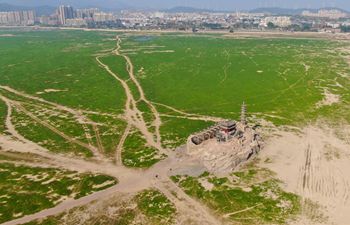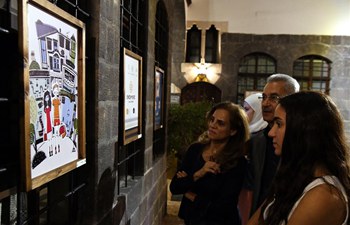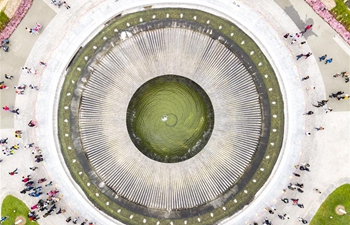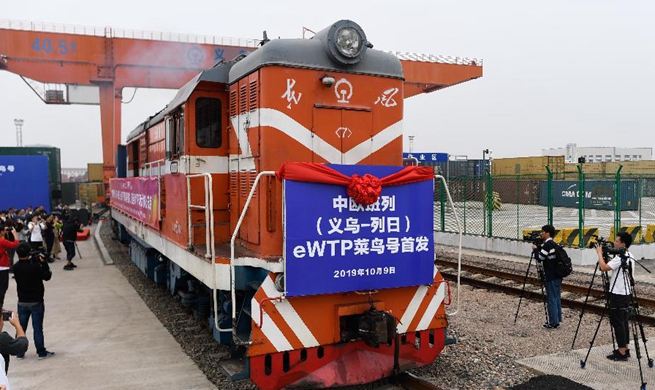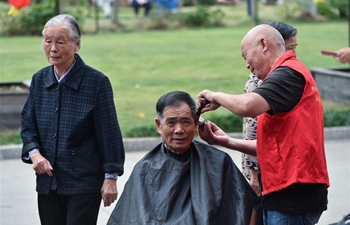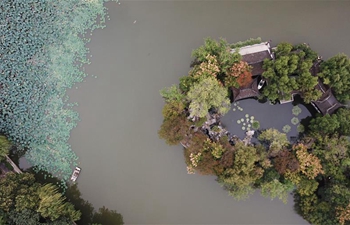MANILA, Oct. 10 (Xinhua) -- The Philippines is one of the so-called "sachet economies" where products are packed and repacked and then sold in one-off plastic packets.
A 2019 study by research agency, Global Alliance for Incinerator Alternatives (GAIA), revealed that the Southeast Asian archipelago uses 60 billion plastic sachets every year.
"On a per capita basis it's about one sachet per person, per day," Froilan Grate of GAIA Asia Pacific said in a report.
This reality has motivated a group of engineers and entrepreneurs to take up an initiative that repurposes sachets, from being polluters to an effective solution to the plastic waste problem of the country.
Green Antz Builders started as an advocacy among friends in 2012, but grew to become a social enterprise that produces eco-friendly construction hollow blocks, called "ecobricks", made of plastic sachets and other non-recyclable wastes.
"Sachets are residual wastes, they are of no commercial value, they can't even be sold to junk shops. But we saw their potential. We decided to turn sachets into something useful", co-founder Mark Yulores told Xinhua.
An ecobrick is composed of 100 plastic laminates, shredded and then mixed with wet cement. This mixture is poured into a brick-pressing machine that the group also invented. The finished product can be used to build various infrastructures, from houses to schools, and buildings.
Ecobricks look different from ordinary building blocks and resemble lego blocks. The plastic laminates also act as an insulator that locks out the heat passing through normal hollow blocks, making ecobricks cooler and more durable.
"We did not just incorporate the plastic sachets so we can call it a 'green' product. We saw a property in those laminates that complement our innovation. And this formulation makes our ecobricks five times stronger than commercial alternatives," Yulores added.
Yulores and his friends set up their first ecohub in Plaridel, Bulacan, a province north of Manila, where they produce over 20,000 ecobricks every month, disposing almost half a ton of sachets.
By tapping on public schools and communities, the group was able to encourage the public to segregate their waste, collect the plastic sachets and bring them to their ecohubs. Their involvement will not go unrewarded -- every 2.5 kilos of sachet they collect will get them a discount on ecobricks they buy.
The reception was positive that led them to open a few eco-stores, where people exchange for food using the sachets they collected. This incentive system is helping Green Antz Builders develop a chain reaction of good environmental practice.
"It's a circular economy model. We take in their waste collection and convert that, but in return we give them a form of incentive, and then they help us in the demand side by using our ecobricks. The more demand, the more plastic we need to process," he said.
A community in Plaridel built a daycare center by collecting and donating their one-off plastics to Green Antz. With discounted ecobricks, the local government was not only able to save money, but provide a sustainable learning facility for kids.
"We are very glad that they helped us put up our center. This is a very ideal project, a first in our community. Because you can never realize that out of trash we can build something like this," said Teresa Viernes of the social welfare office of Plaridel.
Green Antz Builders is not alone in their cause anymore. Private construction companies have started to partner with them, building ten operational ecohubs all over the country. By 2020, the group hopes to build 90 more.
While solving the plastic waste problem in the Philippines has a long way to go, there are continuous initiatives among Filipino communities to help address the problem.
A recycling company in Davao City, southern Philippines, is addressing the shortage of school chairs by converting plastic waste into useful furniture. Thirty kilos of plastic makes up one school chair, which is seen as a significant contribution to the city that handles 500-600 tons of trash every day, most of which end up in waterways.
Meanwhile, a village in Muntinlupa City, south of Manila, has offered rice to its residents in exchange for plastic. The initiative, which started in August, had already collected more than 500 kilos of plastic waste.
